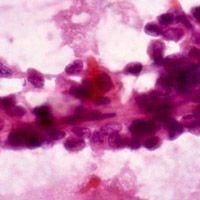Article
New Systemic Adjuvant Therapy in Gastrointestinal Tumors Gains Recognition
Author(s):
Using adjuvant systemic therapy in tangent with surgeries for localized gastrointestinal stromal tumors (GISTs) has been shown to significantly boost survival rates in patients.

Using adjuvant systemic therapy in tangent with surgeries for localized gastrointestinal stromal tumors (GISTs) has been shown to significantly boost survival rates in patients.
Published online in the American Journal of Clinical Oncology, the study highlighted that older patients as well as minorities were less likely to receive adjuvant therapy for GISTs — the most prevalent sarcomas of the GI tract.
To estimate contemporary use, Helmneh Sineshaw, MD, MPH and researchers from the American Cancer Society analyzed data and identified 4,694 patients with localized GIST cases diagnosed between 2004 and 2011.
Their research ultimately helped determine patterns and factors associated with the use of adjuvant therapy.
Sineshaw found that the use of adjuvant systemic therapy more than doubled between 2006 (13.2%) and 2007 (30.5%), peaked at 37.9% in 2009, and dipped to 25.6% in 2011. Additionally, the use of adjuvant systemic therapy decreased with age, was higher in patients with larger tumor size (>10 cm), and was less likely in minorities than in non-Hispanic whites. Furthermore, patients who received adjuvant systemic therapy were found to have 46% lower risk of death than those who were only given surgery.
It’s important to highlight the tremendous strides made in GIST treatment methods over the last decade, particularly with the US Food and Drug Administration’s (FDA) approval of imatinib (Gleevec) for the adjuvant systemic treatment of adult patients (approximately 85-90% of tumors) with the CD117 mutation after surgery.
According to the National Comprehensive Cancer Network (NCCN), adjuvant imatinib treatment was specifically recommended for GISTs with tumor sizes about 3 cm and with “intermediate or high risk of recurrence”.
"Adjuvant systemic therapy use in clinical practice has significantly increased over time with variation by certain factors such as age, race/ethnicity, and tumor size. As the systemic therapy of GISTs evolves, capturing more up-to-date and high-quality data, in addition to clear and consistent treatment guidelines, it is very important to reliably demonstrate treatment patterns and survival outcomes associated with the adjuvant therapy use in clinical practice," concluded the researchers.




